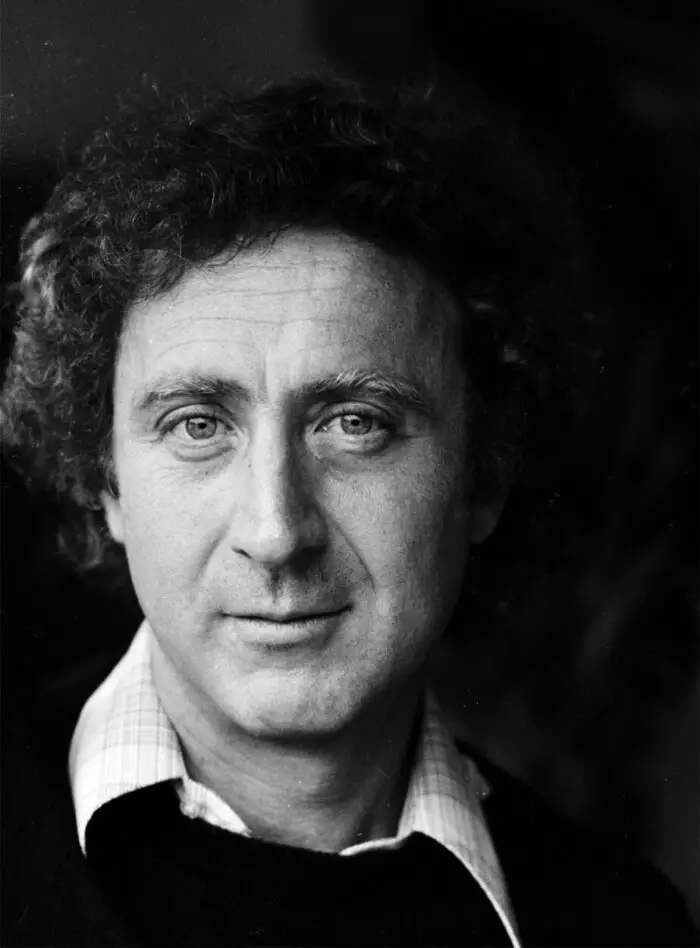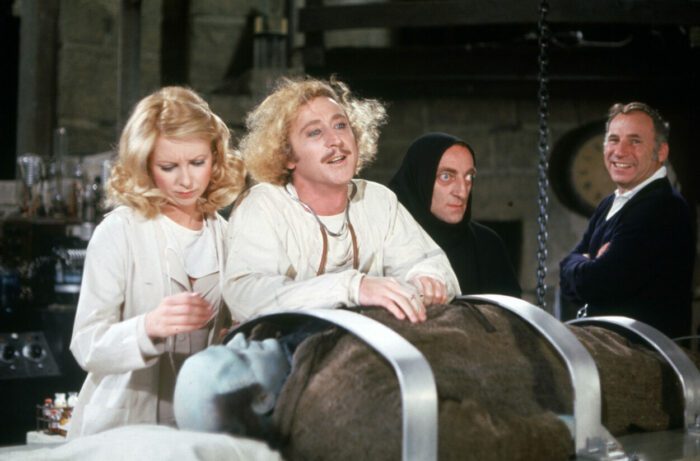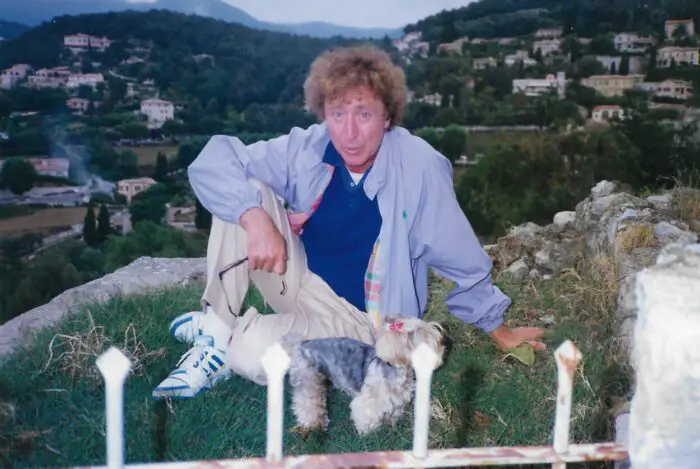For almost any fan of cinema, an hour-and-a-half spent Remembering Gene Wilder is going to be a pleasant journey down memory lane. Director Ron Frank imbues his new documentary with all the mild-mannered, good-humored grace with which we associate the star of Willy Wonka and the Chocolate Factory, Young Frankenstein, and Blazing Saddles. Yet like its subject, Remembering Gene Wilder is more than a superficial star study. It digs in to the complexities of Wilder’s character, both onscreen and off, with more than a little tragedy to balance the memorable comic moments from Wilder’s best films.
In many ways, Remembering Gene Wilder is a conventional Hollywood bio-documentary, a mix of first-person testimony, recorded television appearance, family photos, film clips, and interviews with friends and family. That these are expertly arranged, handsomely shot, and emotionally resonant, with careful attention to the chronological arc of Wilder’s life and career, makes the film a straightforward and largely unassuming presentation. For the most part, that is to say, Frank eschews anything fanciful (like, for instance, Brett Morgen’s wild-ride David Bowie doc Moonage Daydream) and instead lets Wilder and his friends and family tell the man’s story.

And what a story Remembering Gene Wilder is. Born Jerome Silberman in Milwaukee during the Great Depression, Wilder would eventually star in at least three memorably iconic films (and lead or contribute to many more), his persona influenced greatly by key moments in his youth. He was told by doctors never to agitate his mentally-unwell mother, lest he send her to an apoplectic death: from there he developed his preternaturally calm affect, a sweetness used to disarm and charm. Years later, assigned to a Valley Forge psychiatric ward as an Army medic he witnessed fits of uncontrollable rage from inmates; from these he would channel his memorably manic outbursts as Willy Wonka or Dr. Frederick Frankenstein (pronounced “Fronkensteen”). All the while he studied acting and honed his chops at a Hollywood military institute, local theater, and later, the University of Iowa, perfecting his timing.
A chance meeting with Mel Brooks (via his wife Anne Bancroft, with whom Wilder was working) led to a role in The Producers and a longtime collaboration and lifetime friendship. To that point, Wilder’s only screen role had been a small part as a hostage in Arthur Penn’s Bonnie and Clyde. Brooks was charmed by Wilder’s sweet persona and, while The Producers was at the time considered a failure, the film earned Wilder an Academy Award nomination for Best Actor in a Supporting Role. Despite that acclaim, stardom remained elusive, at least for a time: Wilder’s follow-ups Start the Revolution and Quackser were poorly received and Willy Wonka & the Chocolate Factory—though known now as a true classic—was a box office failure.
Oddly enough, it was his performance as a veterinarian who falls in love with a sheep (in Woody Allen’s Everything You Always Wanted to Know About Sex* (*But Were Afraid to Ask) that would mark Wilder’s first commercial success. With it more followed: Wilder shaped a two-page scenario that became, eventually as co-written with and directed by Brooks, the seminal Young Frankenstein, a film on nearly everyone’s list of the greatest comedies ever. While working on its script, Wilder starred in Blazing Saddles as a late-stage replacement as The Waco Kid, called in to play the role of the alcoholic gunslinger only when Gig Young fell ill to the delirium tremens.

While Remembering Gene Wilder does not dwell to any great extent on those two triumphs, it’s hard to claim that any actor ever had a better year than Wilder’s 1974. Moreover, those two roles seem to encapsulate the qualities that made the actor unique. He could, as he did in Young Frankenstein, exude that remarkable serenity as a straight man to the zaniness of Marty Feldmann, Peter Boyle, Teri Garr, and Cloris Leachman around him and then, as tensions reached a fever pitch, explode with the kind of fervor young Jerry Silberman must have witnessed at Valley Forge. In Blazing Saddles, his Waco Kid was witness to all kinds of overt white privilege and racism; at every instance he would, with a laconic sweetness, disarm his opponents and call out their villainy and tomfoolery. His Waco Kid was not just a former drunk; he was a true ally to Cleavon Little’s Sheriff Bart in the best sense of the word.
Wilder’s later pairings with Richard Pryor in Silver Streak, Stir Crazy, and See No Evil, Hear No Evil were every bit as commercially successful and similarly equanimous: in a way, Wilder’s roles became synonymous with interracial friendship and collaboration, a long partnership between two comic geniuses whose very different talents made them near perfect foils. Never mind that a script like See No Evil—or for that matter most of Wilder’s work with Brooks, either, for that matter—would never see the light of day today. They were, for their times, consistently successful, charming filmgoers.
Frank and Remembering Gene Wilder‘s writer Glenn Kirschbaum give roughly equal time to each of these and the last phase of Wilder’s career. There is nearly no mention of his first marriage (to Mary Mercier in the early 1960s), but a loving memory of his marriage to Gilda Radner before she fell to ovarian cancer and his later, longer marriage to Karen Webb, whom he first met while researching his role for See No Evil, Hear No Evil, with whom he shared his colorful, artistically diverse semi-retirement (he studied watercolor and wrote both an autobiography and a novel).
When Wilder passed in 2016, the world learned for the first time that he had suffered from Alzheimer’s Disease for the past three years. His family had kept his disease secret from the public. Remembering Gene Wilder explores the actor’s memory loss and physical degeneration during this time; one of the great tragedies of Wilder’s life is that his iconic performances, memorable forever to film lovers everywhere, were forgotten to the man who played them. Alzheimer’s robbed Wilder of his own memory of having played Willy Wonka and Dr. Frankenstein.

Thankfully, we have his films and his performances to cherish forever and now this documentary to collect the sum of the actor’s experiences and performances in a single setting. With loving reminiscences from Webb, Mel Brooks (still sprightly at 98!), friends like Alan Alda, Carol Kane, Harry Connick, Jr. and others, Remembering Gene Wilder is a touching and timely eulogy for a performer who made—not to exaggerate in the slightest—every one of us who ever saw his films laugh out loud. Wilder was a comic, an actor, a writer, a director, a friend, a painter, a husband, an ally, and a fully human being whose life was lost to a brutal disease, and this documentary does his complex life its full due.




